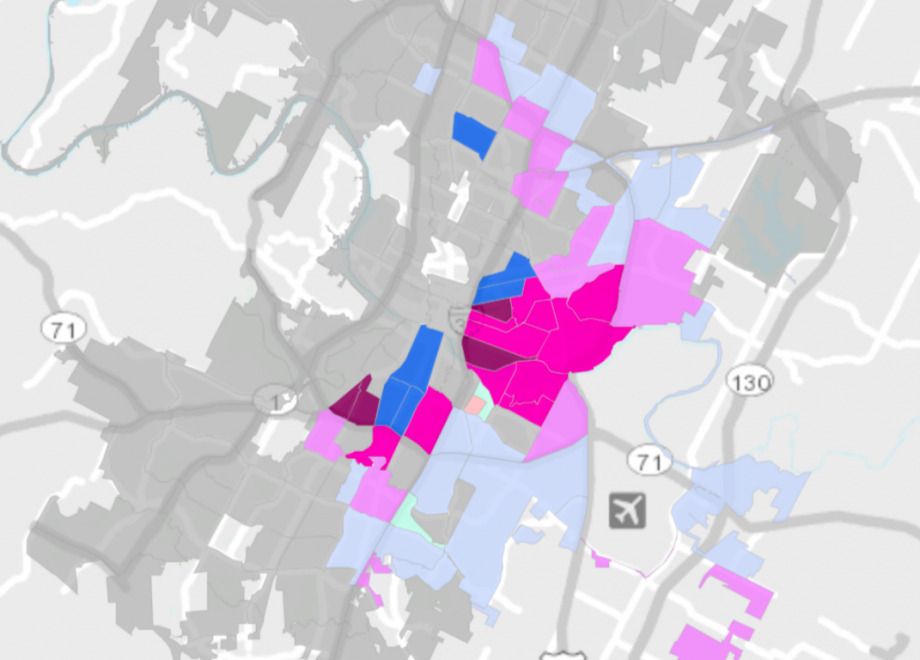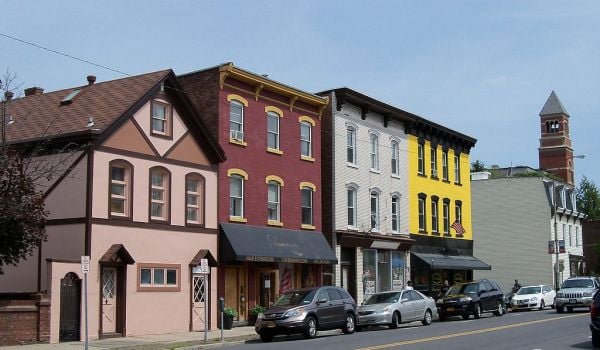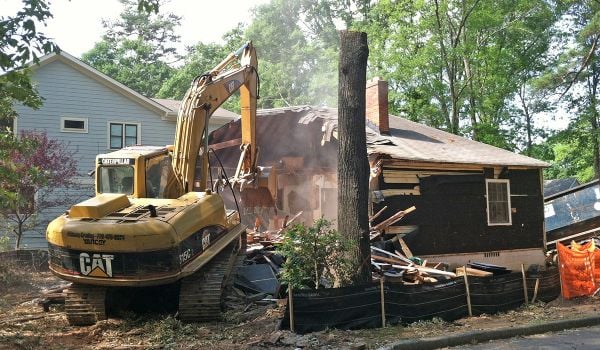With a $250-million affordable housing bond on the ballot this month, Austin already has plenty to consider when it comes to housing affordability. Adding to that: this week’s release of draft recommendations from the city’s Anti-Displacement Task Force.
Austin City Council created the task force by resolution in Aug. 2017, committing members — seven appointed by the mayor, the rest appointed by members of city council — to a ten-month process. Along the way, Austin joined the All In Cities Anti-Displacement Network, as Next City reported previously. In the meantime, two other anti-displacement documents in Austin were published, The People’s Plan to Curb Displacement and Uprooted. The latter came from researchers at the University of Texas, and was accompanied by a mapping tool to view displacement risk throughout Austin.
The task force recommendations open with a section on the limited sources of financing available for anti-displacement work, followed by sections on preventing or rectifying displacement of homeowners, of renters, and of cultural institutions and artists.
The recommendations note that, according to the latest data from the U.S. Department of Housing and Urban Development, Austin has allocated $15 of local housing resources per city resident — as contrasted with Denver allocating $34 of local funds on housing per capita; Philadelphia, $37; Boston, $68; Seattle, $115; Portland, $186; and San Francisco, $536. The document lists several options for increasing that figure in Austin, such as tax increment financing, property tax waivers for projects with a certain amount of affordable housing (which the city already does for selected projects involving a partnership with the Housing Authority of the City of Austin), and developer fees tied to density bonuses.
The draft recommendations also include lobbying the state legislature to remove Texas’ prohibition on inclusionary zoning. According to the task force, Texas is one of only three states that prohibits inclusionary zoning, the use of zoning to require projects to include affordable housing units under certain circumstances.
On homeownership, the task force currently recommends the adoption of “Right to Remain and Right to Return” policies, in alignment with the People’s Plan to Curb Displacement. Such policies or programs would, for example, identify and reach out to residents at risk of displacement to connect them to available resources; residents identified as previously displaced would be prioritized on waitlists for city-financed or city-incentivized housing, or for programs that are designed to assist first-time homebuyers. The recommendations also explore possibilities for limiting or lowering property taxes for long-time homeowners, especially seniors — as done in other cities, such as Philadelphia.
On the renter side, the task force draft includes recommendations to put in place a Tenant Opportunity to Purchase policy, as exists in Washington, D.C., which requires tenants be given an opportunity to purchase their building before a landlord may put it up for sale on the open market. It also recommends a policy such as Chicago’s Troubled Building Initiative, to ensure that landlords do not profit off of neglecting maintenance in their buildings and that there are responsible landlords available to act as receivers or purchasers if owners of neglected properties fail to adhere to compliance timelines. The task force also recommends Austin adopt HUD’s new Small Area Fair Market Rents rule, giving Section 8 rental assistance voucher holders more flexibility for their vouchers to cover higher rents in more desirable neighborhoods.
The task force draft also recommends aggressively enforcing fair housing laws, “which in Austin today are for all practical purposes ignored,” the draft reads. “The City must aggressively root out all vestiges of housing discrimination through law-enforcement actions based on a systemic program of testing, diligent investigation and prosecution.”
On the cultural institutions and artists front, the task force draft recommendations make the connection between stabilizing middle-class or workforce housing as vital to preserving a diverse audience for artists and cultural institutions. It also recommends the creation of a “cultural land trust” that can take ownership to steward properties used as affordable housing for artists or as affordable studio, office, practice and performance space.
The recommendations are open for comment until November 4, according to the Austin Monitor.

Oscar is Next City's senior economic justice correspondent. He previously served as Next City’s editor from 2018-2019, and was a Next City Equitable Cities Fellow from 2015-2016. Since 2011, Oscar has covered community development finance, community banking, impact investing, economic development, housing and more for media outlets such as Shelterforce, B Magazine, Impact Alpha and Fast Company.
Follow Oscar .(JavaScript must be enabled to view this email address)
















